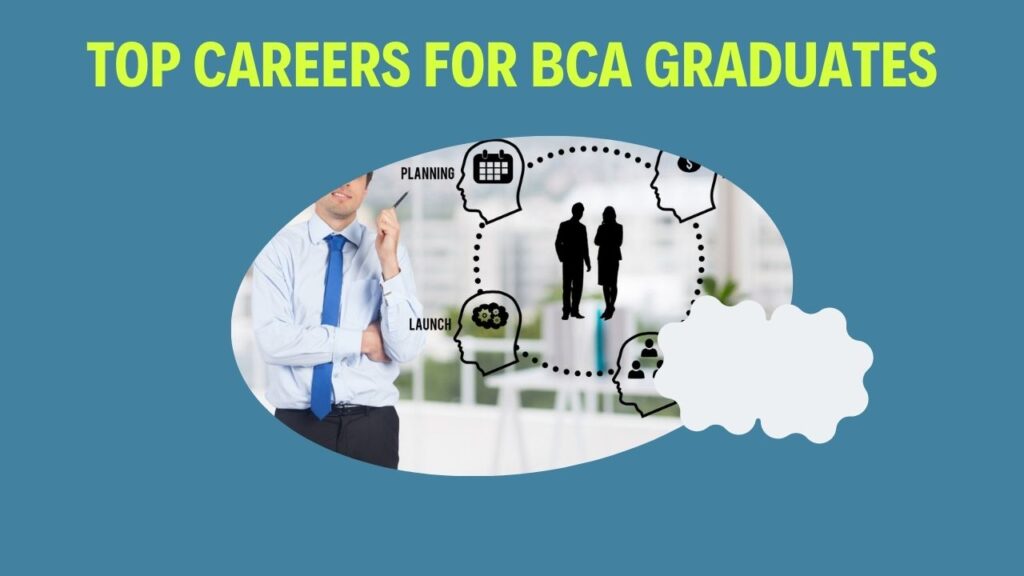In the realm of technology, the Bachelor of Computer Applications (BCA) – a three-year undergraduate programme – is your first step to a successful career. Designed to establish a strong foundation for a thriving IT career, BCA furnishes students with comprehensive knowledge of programming languages, hardware, software, and other crucial domains. This guide delves into the intricacies of the BCA curriculum, enlightening prospective students on eligibility criteria, specialisations, future prospects, and the average income potential.
Eligibility Criteria: Your Gateway to the BCA Course
A key to unlocking the door to the BCA programme is the successful completion of your 10+2 or equivalent qualification from a recognised educational board. It’s requisite for aspirants to have secured a minimum aggregate of 55%. Students awaiting their 10+2 result can also hop on this technological bandwagon.
Unveiling BCA Specialisations

Broaden your IT horizons with an array of BCA specialisations, such as:
- General BCA Program: The BCA General specialisation provides students with a comprehensive understanding of fundamental concepts across computer applications, from programming and database management to networking and software development.
This broad-based curriculum is designed to build a robust foundation, giving students the flexibility to pursue various paths in the IT sector. It enhances students’ adaptability in the dynamic technological landscape and prepares them for a wide array of potential career opportunities.
- Database Systems: The Database Systems specialisation within the BCA programme focuses on the critical domain of database management and design. Students gain a deep understanding of data architecture, database design, data warehousing, and database security.
This specialisation is particularly beneficial for students interested in roles such as Database Administrator, Data Analyst, or Database Developer. By honing their skills in database systems, students become capable of effectively managing, analysing, and safeguarding crucial data, which is a highly sought-after skill set in today’s data-driven world.
- Animation and Multimedia: The Animation and Multimedia specialisation is a creative field within the BCA programme. Students delve into the world of digital art, animation, and multimedia design, learning to create compelling visual narratives and interactive digital content.
From 3D animation to graphic design, this specialisation encompasses a variety of creative disciplines, opening doors to diverse roles such as Animator, Multimedia Artist, Graphic Designer, and more. This specialisation empowers students to bring their creativity to the fore, merging it with technology to create compelling digital experiences.
Landing Dream Roles: Job Profiles for BCA Graduates

Pave the way for an illustrious IT career with these enticing job profiles:
- Programmer: BCA students gain robust skills in various programming languages, enabling them to write, test, and maintain code efficiently. As a programmer, one can expect to work in tech companies, start-ups, and even freelancing. With experience, programmers can advance to roles such as Senior Programmer or Lead Developer.
- System Analyst: BCA graduates are equipped with the knowledge to understand business requirements and design effective IT solutions. As a System Analyst, future growth can lead to roles like IT Project Manager or Business Analyst, with opportunities in industries ranging from IT to finance and healthcare.
- Network Designer: Armed with the knowledge of computer networks, BCA graduates can design and implement efficient network systems as Network Designers. Career growth can lead to senior roles like Network Architect or Network Manager in IT companies and telecommunications firms.
- Game Developer: BCA courses covering animation and multimedia pave the way for graduates to work as Game Developers. With the gaming industry booming globally, there are opportunities to work in game studios or freelance. Future growth can lead to roles like Game Designer or Creative Director.
- Software Engineer: With strong technical skills gained from BCA, graduates can design and build software systems as Software Engineers. They can work in tech companies, start-ups, or even launch their own software products. Career progression can lead to Senior Software Engineer or Software Architect roles.
- Software Tester: BCA graduates can leverage their knowledge of software development to ensure the quality of software products as Software Testers. They can look forward to advancing as Quality Assurance Managers or Test Managers in various industries that rely on software products.
- Project Manager: BCA graduates with a strong understanding of IT and management principles can lead and manage IT projects as Project Managers. With experience, they can advance to roles like IT Director or Chief Technology Officer.
- System Administrator: BCA graduates can maintain and troubleshoot IT systems as System Administrators. Opportunities exist in almost every industry, with career growth leading to roles like IT Manager or IT Director.
- System Security Officer: With an increasing focus on cybersecurity, BCA graduates can protect IT systems as System Security Officers. With experience, they can advance to roles like Information Security Manager or Chief Information Security Officer.
- Software Architect: BCA graduates can leverage their comprehensive understanding of software design and system integration to work as Software Architects. They can design high-level software systems in IT firms, with career progression to roles like Chief Architect or Technology Strategist.
- Associate Software Engineer: As an entry point into software development, BCA graduates can work as Associate Software Engineers, gaining valuable experience in building software systems. They can later progress to roles like Software Engineer and Senior Software Engineer.
Further Studies: Elevating Your Qualifications Post-BCA

After BCA, if you aspire to further enhance your qualifications, the following programmes are available:
- Master of Computer Application (MCA): By deepening their knowledge in advanced computer applications, MCA graduates can take up roles like Senior Software Engineer, IT Consultant or Systems Analyst in leading tech firms, paving the way for career advancement and higher salaries.
- Master’s Degree in Information Management (MIM): This programme sharpens graduates’ analytical abilities and knowledge in managing large-scale information systems, qualifying them for roles like Information Systems Manager or Data Analyst in diverse sectors including finance, healthcare, and IT.
- Masters in Computer Management (MCM): By focusing on the intersection of IT and business management, MCM graduates are primed for leadership roles within the IT sector, such as IT Project Manager or IT Director, where they can influence strategic decision-making.
- Post Graduate Program in Corporate Studies (PGPCS): This program provides a solid grounding in corporate governance, strategy, and management, enhancing the business acumen of BCA graduates. It opens doors to various leadership roles within the corporate sector, offering promising growth prospects.
- Information Security Management (ISM): With cyber threats on the rise, ISM graduates with a deep understanding of information security protocols are in high demand. They can find lucrative roles as Information Security Managers, Cybersecurity Analysts, or Ethical Hackers.
- Master of Business Administration (MBA): An MBA equips BCA graduates with a comprehensive understanding of business management, enabling them to move into managerial or executive roles in the tech industry, such as IT Manager or Chief Technology Officer, thus broadening their career opportunities.
BCA Course Curriculum: A Journey into the IT Domain

The BCA curriculum, meticulously structured across six semesters over three years, provides a robust foundation in computer applications. Students imbibe core technical skills and develop soft skills integral to a successful career in the tech industry.
Here’s a snapshot of the subjects and the yearly breakdown:
Year 1: Building the Foundation
The initial year acquaints students with programming languages, digital electronics, business accounting, and other rudiments of computer applications.
Semester 1:
- Modern Operating Environment
- Financial Accounting
- Principles of Management
- Principle Programming and Algorithm
- Business Communication
- Laboratory course – Tally / MS Office
- Mathematics I
- Computer Fundamentals
- Programming using C
- Communication and Soft Skills
Semester 2:
- C Programming
- Database Management System
- Organisational Behaviour
- Statistics
- E-commerce
- Laboratory Course – C / SQL
- Data Structures
- Object-Oriented Programming and UML with C++
- Business Accounting
- Digital Electronics
- Discrete Mathematics
- Environmental Studies
Year 2: Diving Deeper into IT
In the second year, students delve deeper into computer architecture, networks, web technologies, and other advanced topics.
Semester 3:
- Data structures using C
- Relational Database Management System
- Business Mathematics
- Software Engineering
- Operating System
- Laboratory Course – Data structures using C / PL-SQL
- Computer Networks (Cisco Track)
- Computer Organization and Architecture
- Database Management System & Data Modeling
- Business Communication
Semester 4:
- Object-Oriented Programming in C++
- Human Resource Management
- Enterprise Resource Planning
- Visual Basic
- Computer Networking
- Laboratory Course – VB / C++
- Agile Systems
- Web Technology with PHP
- Python Scripting
- Program Elective I
- Open Elective I
Year 3: Mastery and Specialisation
The final year focuses on advanced topics like Operating Systems, Computer Graphics, E-Commerce, and Software testing, moulding students into competent IT professionals.
Semester 5:
- Web Technologies
- Core Java
- .Net
- Object-Oriented Software Engineering
- Project ( C++ / VB )
- Laboratory Course – Java / Web Technologies / VB.net
- Digital Marketing
- Android Development
- Computer Graphics and Animation
- Program Elective II
- Open Elective II
Semester 6:
- Advanced Web Technologies
- Advanced Java
- Recent Trends in IT
- Software Testing
- Project ( Java / VB .net )
- Laboratory Course – Advanced Web Technologies / Advanced Java
- Information Security
- Program Elective III
- Program Elective IV
In conclusion, a BCA degree serves as an ideal launchpad for those dreaming of a fruitful career in the IT sector. With a curriculum meticulously designed to inculcate necessary tech skills and a plethora of job opportunities post-study, BCA continues to be a preferred choice among tech aspirants.





